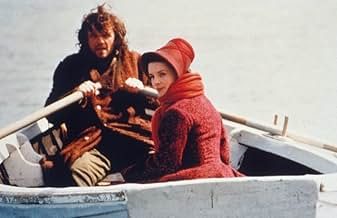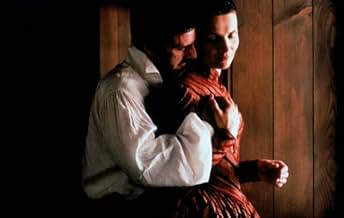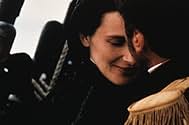IMDb-BEWERTUNG
7,1/10
5822
IHRE BEWERTUNG
In einer kleinen französischen Kolonie tötet ein betrunkener Mann jemanden. Während eine Guillotine verschifft wird, verändert er sich und wird ein guter und beliebter Mann.In einer kleinen französischen Kolonie tötet ein betrunkener Mann jemanden. Während eine Guillotine verschifft wird, verändert er sich und wird ein guter und beliebter Mann.In einer kleinen französischen Kolonie tötet ein betrunkener Mann jemanden. Während eine Guillotine verschifft wird, verändert er sich und wird ein guter und beliebter Mann.
- Regie
- Drehbuch
- Hauptbesetzung
- Auszeichnungen
- 3 Gewinne & 9 Nominierungen insgesamt
Empfohlene Bewertungen
You have to watch the odd foreign film such as this to understand just how far Hollywood has strayed from cinematic honesty. This is a simple, beautifully done, superbly acted piece of theatre set in one of the world's least known places, the fog shrouded French island of St. Pierre, off Newfoundland. It's a simple yet gripping film with an intriguing plot, almost a morality play. There is visceral human drama, much mystery and wonderful soul stirring pathos. And how nice to see a movie without the mandatory Hollywood happy ending. A well spent evening!
This was a nice little film--not great, but nice--and on a grading scale, I'd give it a B or a B-.
Two points to add to what's already been said.
First, for those of you thinking of renting this movie (I rented it on DVD), DO NOT WATCH IT WITH THE ENGLISH DUBBING (available via the "Special Features - Audio" section of the DVD).
The dubbing is horrible; voices sound dubbed, rather than seeming to come from the actors themselves. Worse, I guess in order to make the words seem to match more closely with the movements of the actors' lips, the English dialogue is (IMHO) significantly different from the French! I watched the movie with English dubbing first, then in French with English subtitles. There is actually one point in the movie where someone asks, "Why did so-and-so do that?" The answer is completely different depending on whether you are watching the English or French translation.
The movie is best watched in French--hearing the actors' real voices works so much better than hearing the dubbed voices--with English subtitles, if you need the translation.
Second point: I was disappointed that no backstory (with respect to Le Capitain and La Capitaine) was forthcoming. I thought that the unfolding tale hinted at some sort of secret, something in his (and maybe her) past, that would shed more light on their current actions. In short, I felt that the couple's motivations and character were not sufficiently explored. And if this was because the movie wasn't particularly *about* motivations and in-depth character study, then I actually think that I would have preferred more overtly expressive actors. Enigmatic looks (IMO, that's what they were) without explanation don't really work for me.
Having said that, the movie was still a cut above your ordinary film, and worth the viewing.
Two points to add to what's already been said.
First, for those of you thinking of renting this movie (I rented it on DVD), DO NOT WATCH IT WITH THE ENGLISH DUBBING (available via the "Special Features - Audio" section of the DVD).
The dubbing is horrible; voices sound dubbed, rather than seeming to come from the actors themselves. Worse, I guess in order to make the words seem to match more closely with the movements of the actors' lips, the English dialogue is (IMHO) significantly different from the French! I watched the movie with English dubbing first, then in French with English subtitles. There is actually one point in the movie where someone asks, "Why did so-and-so do that?" The answer is completely different depending on whether you are watching the English or French translation.
The movie is best watched in French--hearing the actors' real voices works so much better than hearing the dubbed voices--with English subtitles, if you need the translation.
Second point: I was disappointed that no backstory (with respect to Le Capitain and La Capitaine) was forthcoming. I thought that the unfolding tale hinted at some sort of secret, something in his (and maybe her) past, that would shed more light on their current actions. In short, I felt that the couple's motivations and character were not sufficiently explored. And if this was because the movie wasn't particularly *about* motivations and in-depth character study, then I actually think that I would have preferred more overtly expressive actors. Enigmatic looks (IMO, that's what they were) without explanation don't really work for me.
Having said that, the movie was still a cut above your ordinary film, and worth the viewing.
The ancient Greeks, gifted with an abstract way of thinking that was always trying to come down to earth and clothe itself with the commonplace occurrences of everyday life, did not have one all-embracing term for love, a we do, but broke it down into four types: affection (storge), friendship (phileo), sex (eros) and charity (agapao). And probably not since the ancient Greeks has a love story come along which not only divides love into its four types, but also weaves them, with enormous skill, into a single story. The Widow of Saint-Pierre is a love story of the tragic Greek proportions. It's an enormously beautiful movie, a story that gains power with every viewing. And for that reason, it's one of the most remarkable videos I've seen in a very long time.
We've all seen a plethora of films from Hollywood, which basically confine love, and the act of love, to eros. We all know the well-worn script. But what would it look like to view a film in which a relationship expresses all four types of love, and throbbing full force? I would be giving too much away if I were to tell you how these four types of love are rolled up so tightly into a single relationship, but that's exactly what we seen in the liaison between Jean, the Captain (Auteuil) and his wife, Pauline (Binoche). It's intensely interesting, because the performances are pitch-perfect. Even the cowardly bureaucrats, who feel threatened by the captain and his wife, are a picture of cowardly perfection. Their motives are all too human, all too real. But so is the unfathomable love they don't understand, and fear.
One of the things I really appreciate about this film is the way it expresses all forms of love as having boundaries. Jean and Pauline are not clinging vines. What we see is a mature, healthy relationship, each partner respecting the unique characteristics of the other. What a contrast to the infantile clinging vine romances out of Hollywood!
We've all seen a plethora of films from Hollywood, which basically confine love, and the act of love, to eros. We all know the well-worn script. But what would it look like to view a film in which a relationship expresses all four types of love, and throbbing full force? I would be giving too much away if I were to tell you how these four types of love are rolled up so tightly into a single relationship, but that's exactly what we seen in the liaison between Jean, the Captain (Auteuil) and his wife, Pauline (Binoche). It's intensely interesting, because the performances are pitch-perfect. Even the cowardly bureaucrats, who feel threatened by the captain and his wife, are a picture of cowardly perfection. Their motives are all too human, all too real. But so is the unfathomable love they don't understand, and fear.
One of the things I really appreciate about this film is the way it expresses all forms of love as having boundaries. Jean and Pauline are not clinging vines. What we see is a mature, healthy relationship, each partner respecting the unique characteristics of the other. What a contrast to the infantile clinging vine romances out of Hollywood!
In 1849, in the Archipelago of Saint-Pierre et Miquelon, the drunken Ariel Neel Auguste (Emir Kusturica) and his partner Louis Ollivier (Reynald Bouchard) kill for a futile motive (to see if he is fat or just big) the fishing boat captain Coupard (Michel Daigle). Nell, who stabbed the victim, is sentenced to die with his head severed in the guillotine while Louis is sentenced to hard labor. During the transportation to the prison under the custody of Captain Jean (Daniel Auteuil), there is an accident and Louis dies. While spending his days in the cell waiting for the guillotine and the executioner, Neel is invited by the captain's wife Mrs. Pauline (Juliette Binoche) to help her in her garden and becomes her protégé. Later he has a process of rehabilitation helping the locals in minor works and becomes very popular in the island. When he saves the building Café du Nord and her owner from sinking in the sea, his popularity increases and nobody but the governor and politicians of the council wants his death. Neel marries Eleontine Jeanne-Marie, but sooner he is informed that the ship Marie Galante has just left Martinique bringing a guillotine. Now the Governor and politicians need to find an executioner in the population to execute the sentence.
"La Veuve de Saint-Pierre" is a beautiful dramatization of a story of rehabilitation and intolerance. I do not know whether this event is partially true or not – there are references in Internet to this story but in sites that I can not trust – but this movie is wonderful. The story and screenplay are engaging and very well written with powerful lines; the direction of Patrice Leconte and the performances are top- notch, with Juliette Binoche extremely beautiful and elegant as usual and showing a magnificent chemistry with Daniel Auteuil; the cinematography and costumes are wonderful. Based on my adjectives, it is unnecessary to say that I loved this movie. My vote is eight.
Title (Brazil): "A Viúva de Saint-Pierre" ("The Widow of Saint-Pierre")
"La Veuve de Saint-Pierre" is a beautiful dramatization of a story of rehabilitation and intolerance. I do not know whether this event is partially true or not – there are references in Internet to this story but in sites that I can not trust – but this movie is wonderful. The story and screenplay are engaging and very well written with powerful lines; the direction of Patrice Leconte and the performances are top- notch, with Juliette Binoche extremely beautiful and elegant as usual and showing a magnificent chemistry with Daniel Auteuil; the cinematography and costumes are wonderful. Based on my adjectives, it is unnecessary to say that I loved this movie. My vote is eight.
Title (Brazil): "A Viúva de Saint-Pierre" ("The Widow of Saint-Pierre")
I was most impressed with the visual language of this movie that does not waste words to show emotions. The tensions are well reflected in the play of the actors, whose gestures, shrugs and smiles say more than a thousand lines.
Another interesting feature of the movie is that it does not follow the easy path of romance that is "expected" by the public. In turn, it exposes a world which is cruel, unfair, where justice is determined by personal interests and where those who fight the system are seen as mad and excluded from the "high society".
It is a movie about the determination to fight for something one believes in!
Another interesting feature of the movie is that it does not follow the easy path of romance that is "expected" by the public. In turn, it exposes a world which is cruel, unfair, where justice is determined by personal interests and where those who fight the system are seen as mad and excluded from the "high society".
It is a movie about the determination to fight for something one believes in!
Wusstest du schon
- WissenswertesThe film was to be completely filmed on the island of Saint-Pierre, but when the snow failed to arrive, the production had to move further north to Newfoundland for certain sequences.
- PatzerWhen Neel is told he's strong enough to "ramer jusqu'au chez les Anglais", the English subtitles say "row over to Canada" rather than "row over to the English". This introduces an error: both the geography and the dialogue in other scenes make it clear that Newfoundland is meant, but Newfoundland wasn't part of Canada until 1949.
- VerbindungenFeatured in The 58th Annual Golden Globe Awards 2001 (2001)
Top-Auswahl
Melde dich zum Bewerten an und greife auf die Watchlist für personalisierte Empfehlungen zu.
- How long is Widow of St. Pierre?Powered by Alexa
Details
- Erscheinungsdatum
- Herkunftsländer
- Offizieller Standort
- Sprache
- Auch bekannt als
- Widow of St. Pierre
- Drehorte
- Fortress of Louisbourg, Louisbourg, Nova Scotia, Kanada(as Saint-Pierre)
- Produktionsfirmen
- Weitere beteiligte Unternehmen bei IMDbPro anzeigen
Box Office
- Budget
- 100.000.000 FRF (geschätzt)
- Bruttoertrag in den USA und Kanada
- 3.193.889 $
- Eröffnungswochenende in den USA und in Kanada
- 31.702 $
- 4. März 2001
- Weltweiter Bruttoertrag
- 7.193.889 $
- Laufzeit
- 1 Std. 52 Min.(112 min)
- Farbe
- Sound-Mix
- Seitenverhältnis
- 2.35 : 1
Zu dieser Seite beitragen
Bearbeitung vorschlagen oder fehlenden Inhalt hinzufügen




















